Air strikes kill at least 40 in northern Syria: monitoring group
Many of the deceased were civilians: Syrian Observatory for Human Rights
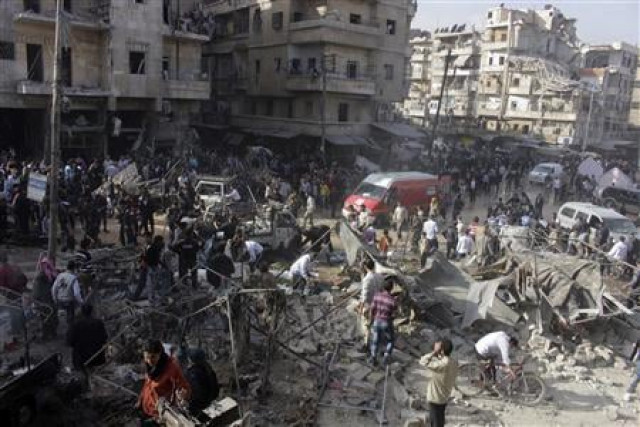
People search for survivors amid the rubble of collapsed buildings in Aleppo. PHOTO: REUTERS
The pro-opposition monitoring group said there were at least six strikes on the outskirts of Aleppo and nearby towns. Dozens of people were wounded, it said.
"Some of the strikes in the neighborhood of Tareeq al-Bab appeared to be targeting rebel headquarters but instead the rockets fell in a busy street and caused heavy civilian casualties," Rami Abdelrahman, head of the Observatory, said by telephone.
Oil field capture
Rebels led by al Qaeda-linked fighters seized Syria's largest oil field on Saturday, cutting off President Bashar al-Assad's access to almost all local crude reserves, activists said.
There was no immediate comment from the government and it was not immediately possible to verify the reports of the capture independently.
But the loss of the al-Omar oil field in Deir al-Zor province, if confirmed, could leave Assad's forces almost completely reliant on imported oil in their highly mechanised military campaign to put down a 2-1/2-year uprising.
"Now, nearly all of Syria's usable oil reserves are in the hands of the Nusra Front and other Islamist units ... The regime's neck is now in Nusra's hands," said Rami Abdelrahman, head of the pro-opposition Syrian Observatory for Human Rights.
Assad's forces have gained momentum against the rebels in recent months, partially due to support from the Lebanese Shi'ite milita Hezbollah and its regional ally Iran.
Foreign powers are trying to bring together the warring parties at an international peace conference, dubbed 'Geneva 2', planned for mid-December. Both the Syrians and their international partners are at odds over terms for the talks.
Syria's peace envoy Lakhdar Brahimi discussed the conference on Saturday with Russian Foreign Minister Sergei Lavrov in Geneva. He is expected to meet US Secretary of State John Kerry later.
Fuel from Iran
The civil war in Syria has killed more than 100,000 people, according to the United Nation and it is destabilising its neighbours, due to sectarian and ethnic tensions that transcend borders.
The rebels draw support from radical groups such as al Qaeda and other foreign militants.
Until the reported insurgent capture of the field, a pipeline transporting the crude to central Syria for refinement had still been working despite the civil war.
Most oil reserves are now in the hands of rebels, local tribes or Kurdish militias, some of whom may be willing to sell oil Assad.
Assad is also believed to be getting fuel from Iran, his main regional ally. Tehran has been bankrolling the Syrian government's fight against the rebels and offering military support.
A video posted on the internet showed rebels in camouflage and black scarves driving a tank under a sign that read "Euphrates Oil Company - al-Omar field." The speaker in the video said the field was overrun at dawn on Saturday, but the authenticity of the footage could not be independently verified.
Syria is not a significant oil producer and has not exported any oil since late 2011, when international sanctions took effect to raise pressure on Assad. Prior to the sanctions, the country exported 370,000 barrels per day, mainly to Europe.
The conflict began in March 2011 as peaceful protests against four decades of Assad family rule but has degenerated into a civil war were more than 100 people are killed each day.
Rebel offensive
Despite international efforts to launch peace talks, neither the rebels or Assad's forces appear ready to lay down arms.
Activists near Damascus said a heavy battle was raging in the eastern suburbs outside the capital between the army and pro-government militias and rebel units, including the Islamic State of Iraq and the Levant (ISIL), an al Qaeda affiliate.
Rebels are trying to retake the town of Oteiba in order to break a heavy blockade on the opposition-held suburbs in the east that ring the capital. For months Assad's forces have choked off the areas from both food, supplies and weapons.
The fighting caused dozens of deaths on both sides, a fighter in the area said.
In Switzerland, diplomatic wrangling continued as the international supporters of different sides of the conflict discussed a framework for talks.
Moscow, Assad's main arms supplier, wants Iran to participate in the peace conference, which is opposed by both the United States and Saudi Arabia, a regional rival of Tehran and major backer of the rebels.
Brahimi is to hold "trilateral" talks with Russian deputy foreign ministers Mikhail Bogdanov and Gennady Gatilov, as well as U.S. Under Secretary Wendy Sherman, in Geneva on Monday.

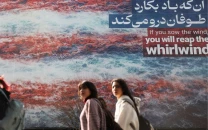
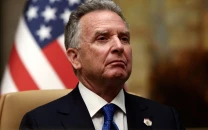

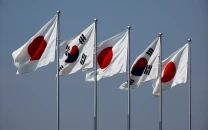
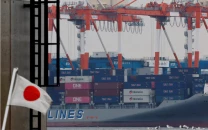












COMMENTS
Comments are moderated and generally will be posted if they are on-topic and not abusive.
For more information, please see our Comments FAQ